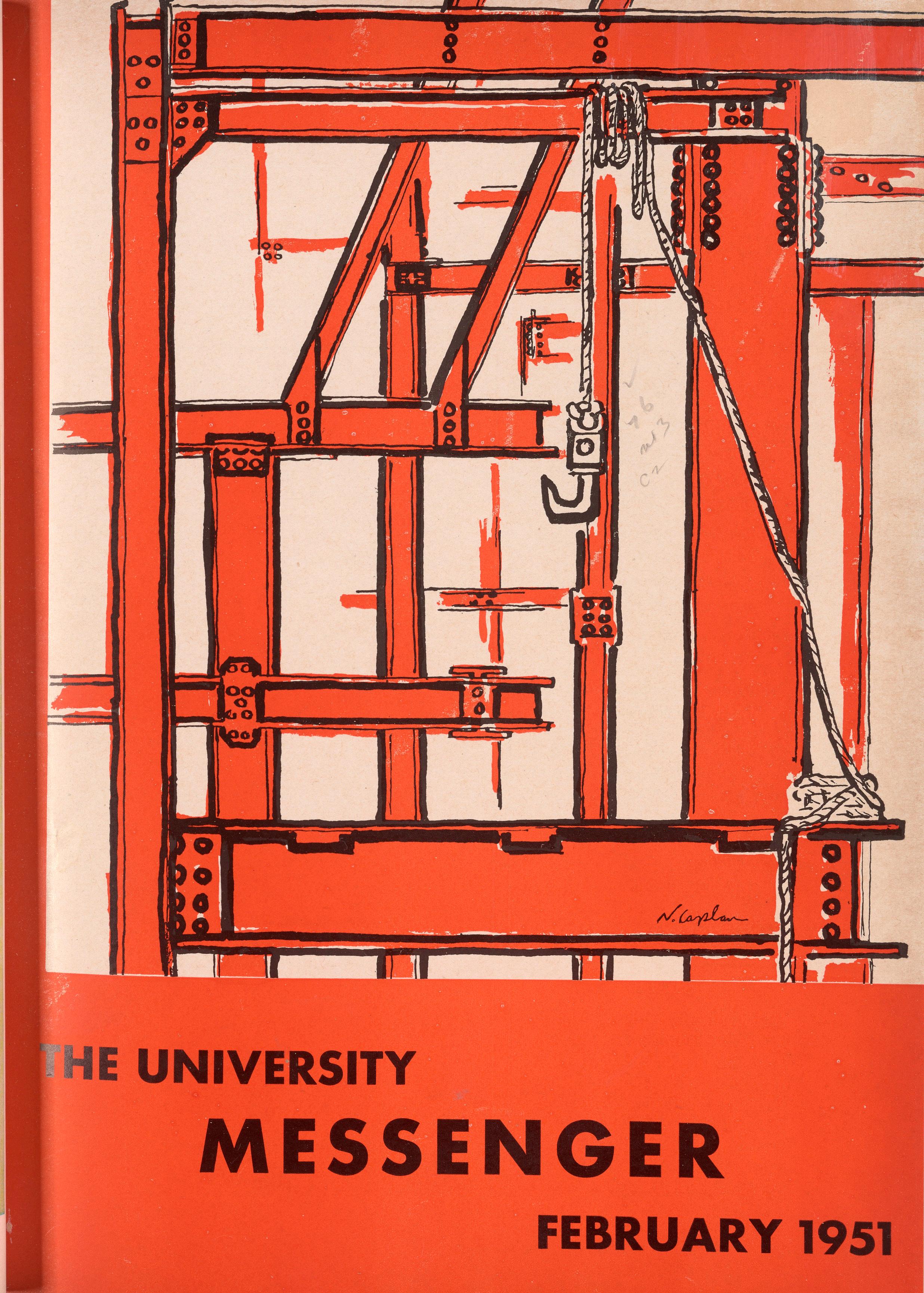

E UNIVERSITY MESSENGER
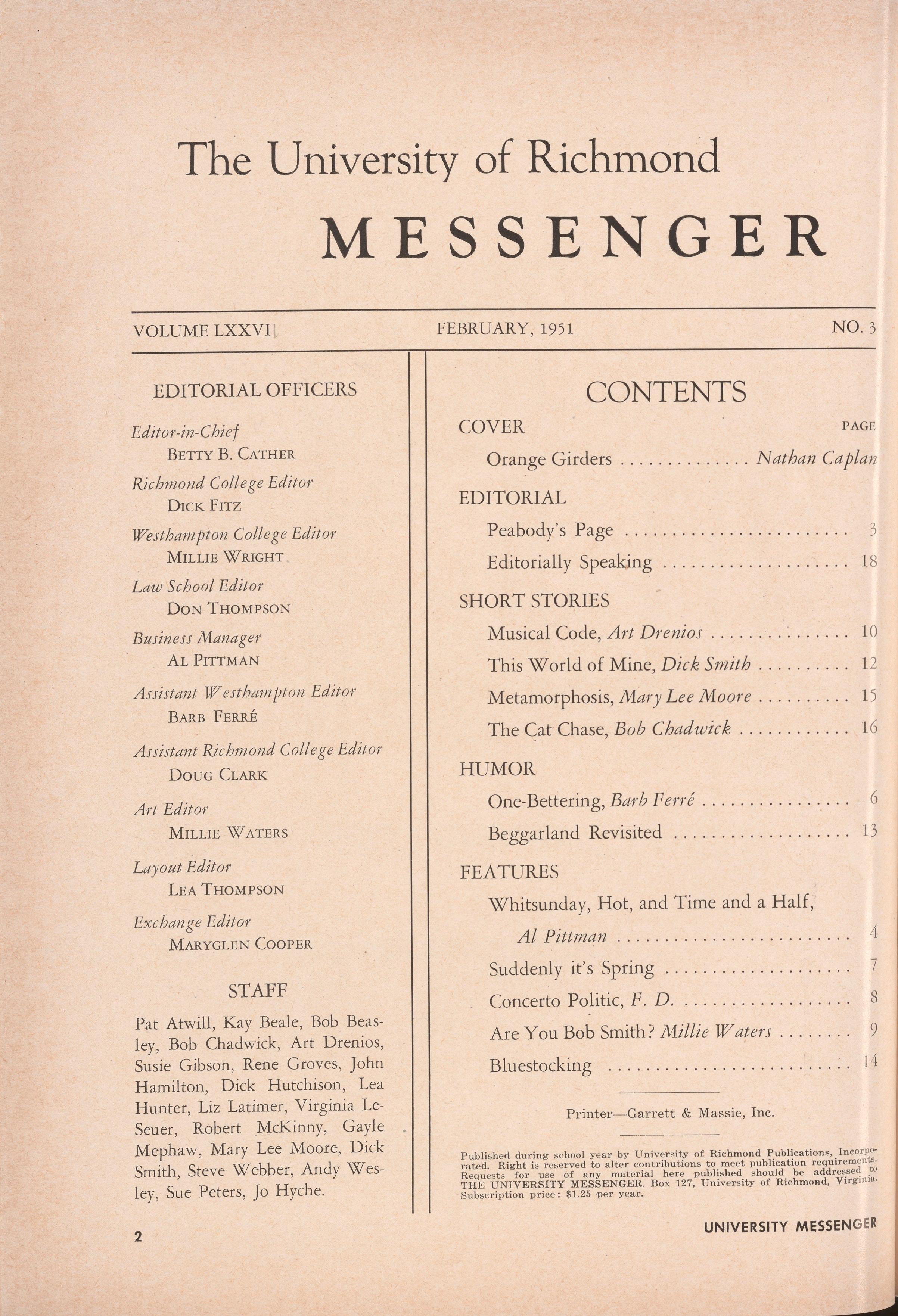
The University of Richmond MESSENGER
VOLUME LXXVI 1
EDITORIAL OFFICERS
Edito1'-in-Chief
BETTY B. CATHER
Richmond College Edito1'
DICK FITZ
Westhampton Colleg e Edito1'
MILLIE WRIGHT
Law School Editor
DON THOMPSON
Business Manager
AL PITTMAN
Assistant Westhampton Edito1'
BARB FERRE
Assistant Richmond College Editor
DOUG CLARK
Aft
Layout
LEA
Exchange
sits in a windowless office not knowing it's hot and most certainly never having heard of Whitsunday. But she knows it's Sunday-and working overtime means time and a half. And time and a half means larger checks. And larger checks mean more money. Jenny Shultz can do more with her money than her time. So she works on Sundays-and doesn't mind missing a day off. Every working day of every month, from eight to five ( with time out for lunch and two rest periods) she opens files and counts cards and closes files. Jenny Shultz knows nothing else. And this is why she opens, counts, and closes with content. And after all, what more of life should a Grade Two clerk be entitled to know? A Grade Two who has never had a lover nor even a date. A Grade Two who lives alone in a dingy G Street rooming house of smelly cats, creaky stairs, and skylighted bathrooms, who spends her money, her time, and her dreams in the dim of Loew' s Palace and the Warner. A Grade Two who drinks too many cokes and recklessly gam bles a quarter in the bi-monthly office pool, that she never wins. What more is life but the daily counting and what's showing at the Palace? Jenny Shultz doesn't know and is content with time and a half.
It is a day for walking and seeing. The walkers come by the thousands, and they walk and see the federal streets and the federal circles, the federal buildings and the federal people. And down deep in their hearts, they all hope for the chance of seeing the president. Soldiers and sailors on leavebusily snap pictures and touch other pictures in spite of the signs that read "please do not touch." And the Southerners breathe the Yankee atmosphere, and vainly trying to ignore the uppity northern niggers, wish for Savannah. The Northerners feel the charm and the heat of the South, note the poverty of the Southern blacks, and yearn for the cool of Yonkers. The natives remain inside and aloof. For to go out is to be lost in the crowd.
On upper 16th Street, it is the day of the morning after the night before for an attache in a legation bed. He yawns and scratches and tastes the brownness in his mouth. With effort, he rises to draw the blind to halt the daylight. For a moment he ponders the triangle bounded by the Mormon spire, Unitarian columns, and a Baptist tower of Georgian lines. But only for a moment. The blind swings shut. He scratches and yawns and is asleep.
A new day, a new week, a new month. Perhaps a new beginning. But there are the few who fail FEBRUARY, 1951
to comprehend-the few who know not the time in eternity-nor the heat of the day. These are the stone ones and the bronze ones. These are the ones who cannot cry and cannot laugh-nor breathe nor feel. These are the past on mount and pedestal and wall.
Lincoln sits even now in the hush of his marble temple, Saint Francis stands in a garden, Asbury on his horse, and Joan the Maid on hers, U. S. Grant on his, and Longfellow in a chair. While Grief still watches and waits at the side of a dead wife in the shade of the tombstones. These and the others cannot recognize Sunday. They fail to understand that Monday is tomorrow.
And after all, why should they?
-AL PITTMAN.
True or False: D.N.G. (Do not guess.)
Typically, though not always, but usually in the majority of cases, with few deviations, in the embryonic form, with few minor exceptions, not to mention a few major ones, monotremes lay eggs.
D N.G.
ANS. Usually false although sometimes true. Anyway who wants to know?

Two -He'2ds Q.re better -tho.nOn£ .
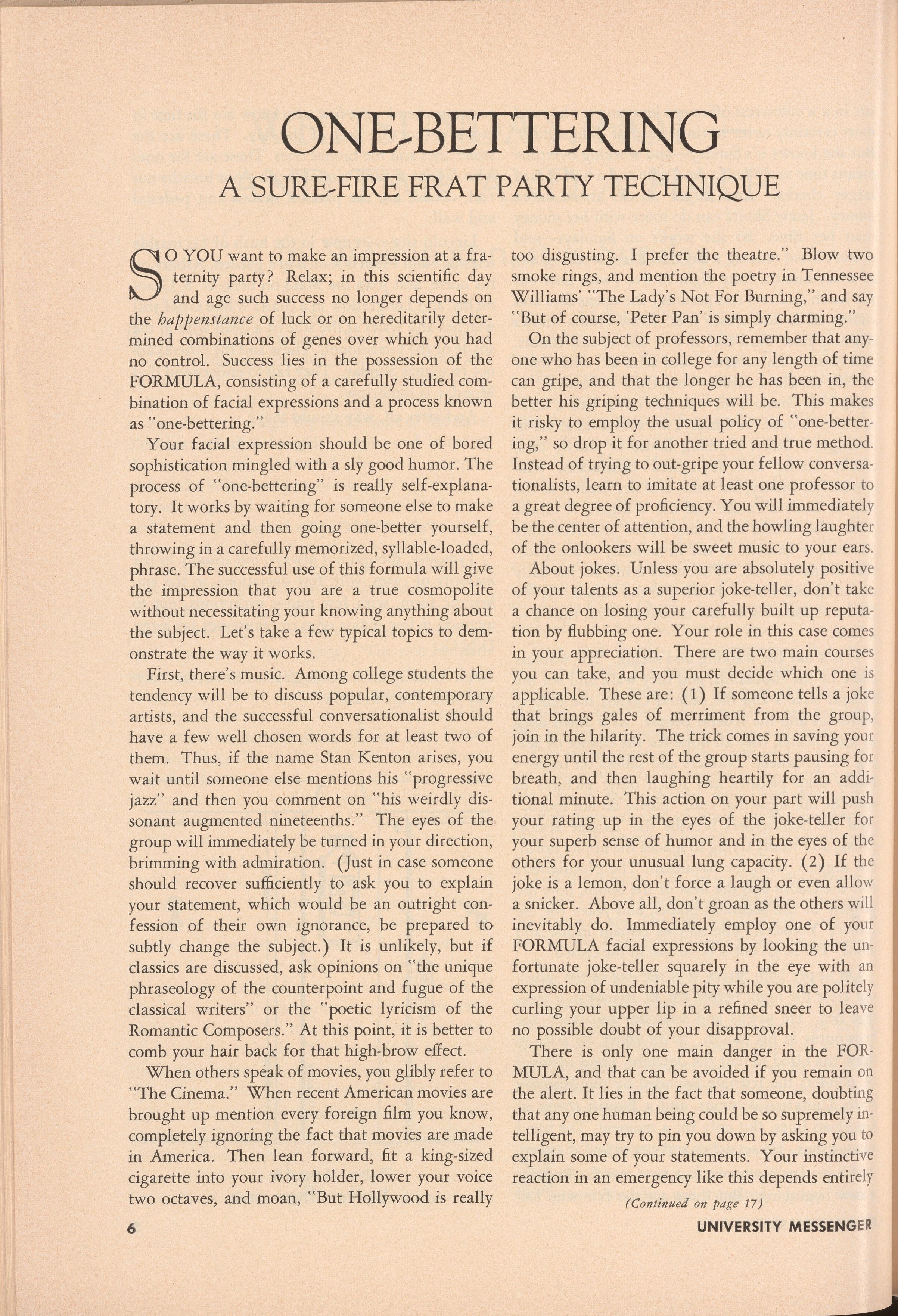
ONE--BETTERING
A SURE--FIREFRAT PARTY TECHNIQUE
SO YOU want to make an impression at a fraternity party? Relax; in this scientific day and age such success no longer depends on the happenstance of luck or on hereditarily determined combinations of genes over which you had no control. Success lies in the possession of the FORMULA, consisting of a carefully studied combination of facial expressions and a process known as "one -bettering ."
Your facial expression should be one of bored sophistication mingled with a sly good humor. The process of "one-bettering" is really self-explanatory. It works by waiting for someone else to make a statement and then going one-better yourself, throwing in a carefully memorized, syllable-loaded, phrase. The successful use of this formula will give the impression that you are a true cosmopolite without necessitating your knowing anything about the subject. Let's take a few typical topics to demonstrate the way it works.
First, there's music. Among college students the tendency will be to discuss popular, contemporary artists, and the successful conversationalist should have a few well chosen words for at least two of them. Thus, if the name Stan Kenton arises, you wait until someone else mentions his "progressive jazz" and then you comment on "his weirdly dissonant augmented nineteenths." The eyes of the group will immediately be turned in your direction, brimming with admiration. (Just in case someone should recover sufficiently to ask you to explain your statement, which would be an outright con£ession of their own ignorance, be prepared to subtly change the subject.) It is unlikely, but if classics are discussed, ask opinions on "the unique phraseology of the counterpoint and fugue of the classical writers" or the "poetic lyricism of the Romantic Composers." At this point, it is better to comb your hair back for that high-brow effect. When others speak of movies, you glibly refer to "The Cinema." When recent American movies are brought up mention every foreign film you know, completely ignoring the fact that movies are made in America. Then lean forward, fit a king-sized cigarette into your ivory holder, lower your voice two octaves, and moan, "But Hollywood is really 6
too disgusting. I prefer the theatre." Blow two smoke rings, and mention the poetry in Tennessee Williams' "The Lady's Not For Burning," and say "But of course, 'Peter Pan' is simply charming." On the subject of professors, remember that anyone who has been in college for any length of time can gripe, and that the longer he has been in, th e better his griping techniques will be. This make s it risky to employ the usual policy of "one-bettering," so drop it for another tried and true method Instead of trying to out-gripe your fellow conversationalists, learn to imitate at least one professor t o a great degree of proficiency. You will immediatel y be the center of attention, and the howling laughte r of the onlookers will be sweet music to your ears About jokes. Unless you are absolutely positiv e of your talents as a superior joke-teller, don't tak e a chance on losing your carefully built up reputation by flubbing one. Your role in this case comes in your appreciation. There are two main courses you can take, and you must decide which one is applicable. These are: (1) If someone tells a joke that brings gales of merriment from the group , join in the hilarity. The trick comes in saving your energy until the rest of the group starts pausing for breath, and then laughing heartily for an add itional minute. This action on your part will push your rating up in the eyes of the joke-teller for your superb sense of humor and in the eyes of th e others for your unusual lung capacity. (2) If th e joke is a lemon, don't force a laugh or even allo w a snicker. Above all, don't groan as the others will inevitably do. Immediately employ one of your FORMULA facial expressions by looking the unfortunate joke-teller squarely in the eye with an expression of undeniable pity while you are polite ly curling your upper lip in a refined sneer to lea ve no possible doubt of your disapproval.
There is only one main danger in the FO RMULA, and that can be avoided if you remain on the alert. It lies in the fact that someone, doubti ng that any one human being could be so supremely intelligent, may try to pin you down by asking you to explain some of your statements. Your instincti ve reaction in an emergency like this depends entirely
(Continued on page 17)
UNIVERSITYMESSENGER
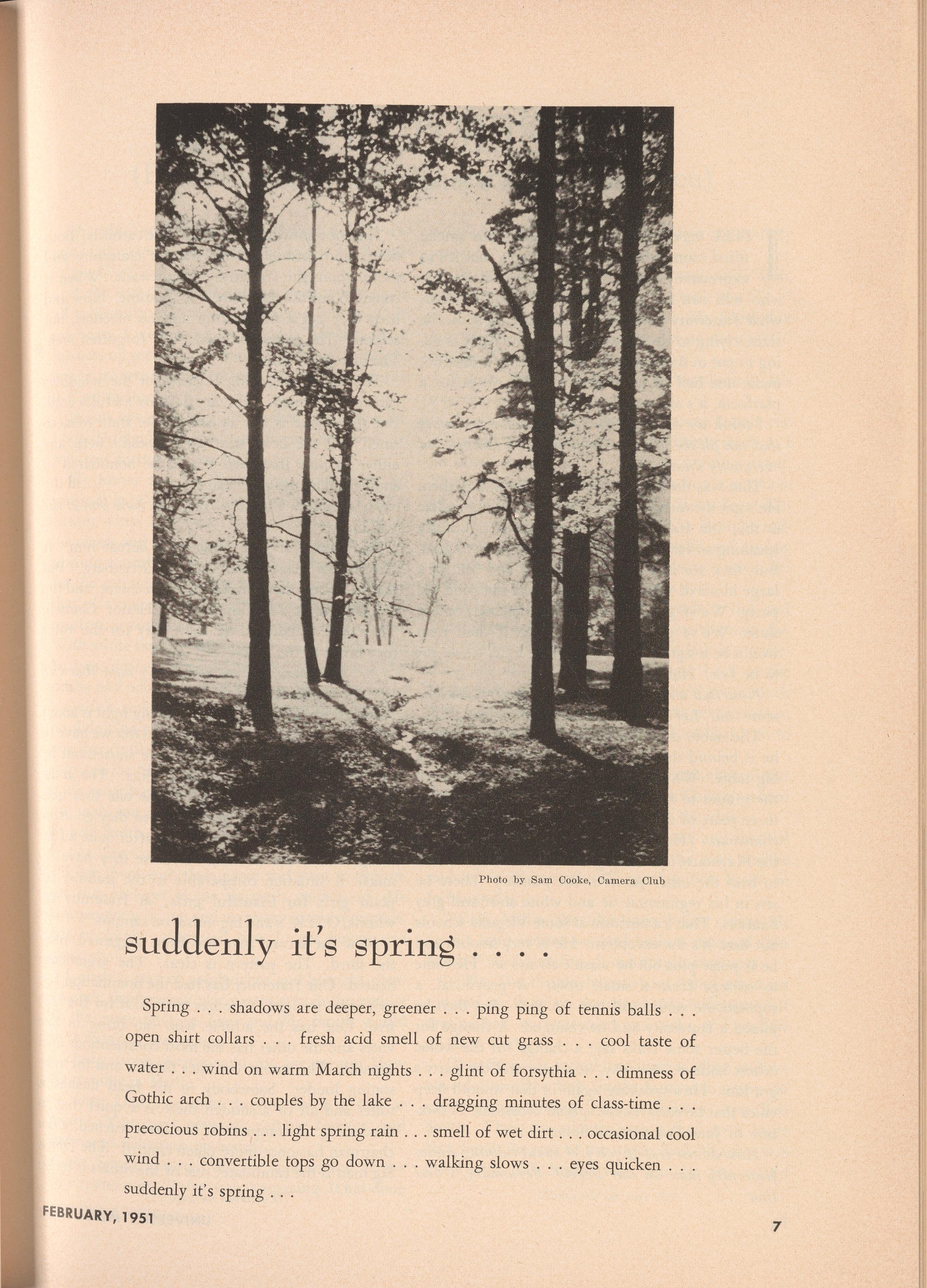
suddenly it's spring
Spring shadows are deeper, greener ... ping ping of tennis balls open shirt collars . . . fresh acid smell of new cut grass . . . cool taste of water ... wind on warm March nights . .. glint of forsythia . . . dimness of Gothic arch . .. couples by the lake ... dragging minutes of class-time precocious robins ... light spring rain smell of wet dirt ... occasional cool wind ... convertible tops go down walking slows . . . eyes quicken . . . suddenly it's spring ... FEBRUARY, 1951
Photo by Sam Cooke, Camera Club
CONCERTOPOLITIC
music from a smoke filled room ....
IFEEL very much out of place in this smoke filled room (that's a cliche, I know, but it's so expressive). Here I am trying to help decide who will run for student government or rather, what fraternity brothers of mine can I get on the slate, trying to decide what planks the party is going to put in the platform, and realizing it does not make one hell of a difference. Who votes for a platform, it's always the candidate.
I think we have the man right in our fraternity that can fill the job. He's well liked on campus and everybody knows him
That was the president of Beta Phi talking then. He's got the man, he says. What he does not realize is that his fraternity has gone down politically speaking so far that they can never see office again. But, they are still a large fraternity and control a large block of votes. And they are in the good old party. We've got to let them put somebody on the slate. We've got to be fair. Even if their man would be a square block in a round hole, we've got to be fair. Hell.
Now that we have the senatorial posts filled let's move on. Let's hear some suggestions for -
The noble chairman of the party speaks. There he is behind the big table. A big wheel behind a big table. Why is he chairman? He doesn't have the grades to run for an office but because of his three years of outstanding service to the party he is chairman. (He once hung up political posters on the Playhouse in a driving rain after midnight. Had to beat the other party to the punch.) There he sits in his regimental tie and white shirt and grey Rannels. That's a uniform at some Virginia schools but here it's the exception. He is very smooth and he is poise plus but he wasn't always so. He came to college from a small town. A provincial, a sophisticate would call him. A hick. But then he joined a fraternity and he changed. A change for the better some folks say; a change for the worse others believe. Anyway, he's here and the party's got him. He's speaking again in that smooth deep voice that he reserves for special occasions. A mixture of Jane Froman and honey.
How do the rest of you feel about running a nonfraternity man on our ticket? Personally , I feel that ...
8

The poor nonfraternity man. The catbirds. Both those who sincerely don't want a fraternity and those whom the fraternities don't want. When it comes to politics they have a rough time. Now and then they get a nomination and an election, but seldom. The unwanted men. The forgotten men. The disregarded men.
The smoke is getting thicker but the windows can not be opened. February days are awfully cold. But the smoke is not as bad as the stale tobacco smell and the head next door doesn't help any either. Funny that men should be nominated in smoky rooms next to heads.
He ' s f ewish. You think that will hurt him at th e polls?
Hurt him? It will damn near defeat him. A Green gets more votes than a Greenberg. But there ' s always that gentleman's agreement, and th e defeated ones wind up on the Honor Council. They have to be paid off some way for the vote s they bring to the party.
Mr. Chairman, we have th e only man that can win the presidency for om· party
At last it's out in the open. The big fight is abou t to begin. Out of the three top candidates we have to choose one and the Delta Sigs have started out by naming their man. The Delta Sigs. The mo st hated fraternity on campus but the one that get s away with a lot of the gravy. When they go aft er something they get it, and they go after quite a few things. They are not liked because they have so much. A situation comparable to the jealousy of plain girls for beautiful girls. A fraternity of wheels, O.D.K.'s and big noises on campus.
Now the second man has been suggested, n ow the third. The pattern is clear. The argumen ts heated. One fraternity has had the nomination for two years straight. One has not had it for the l ast five. One has the athlete who can bring in the votes and the other has the most conscientious an d capable. The smoke becomes thicker and the reasoning louder. Somebody in the head Rushes a toilet and all of a sudden there is a quiet that is deadening. A compromise has been reached O ur chairman has once more taken control. The De lta Sig man is the candidate; one of the others is to be
(Continued on pag e 17)
UNIVERSITYMESSENGER
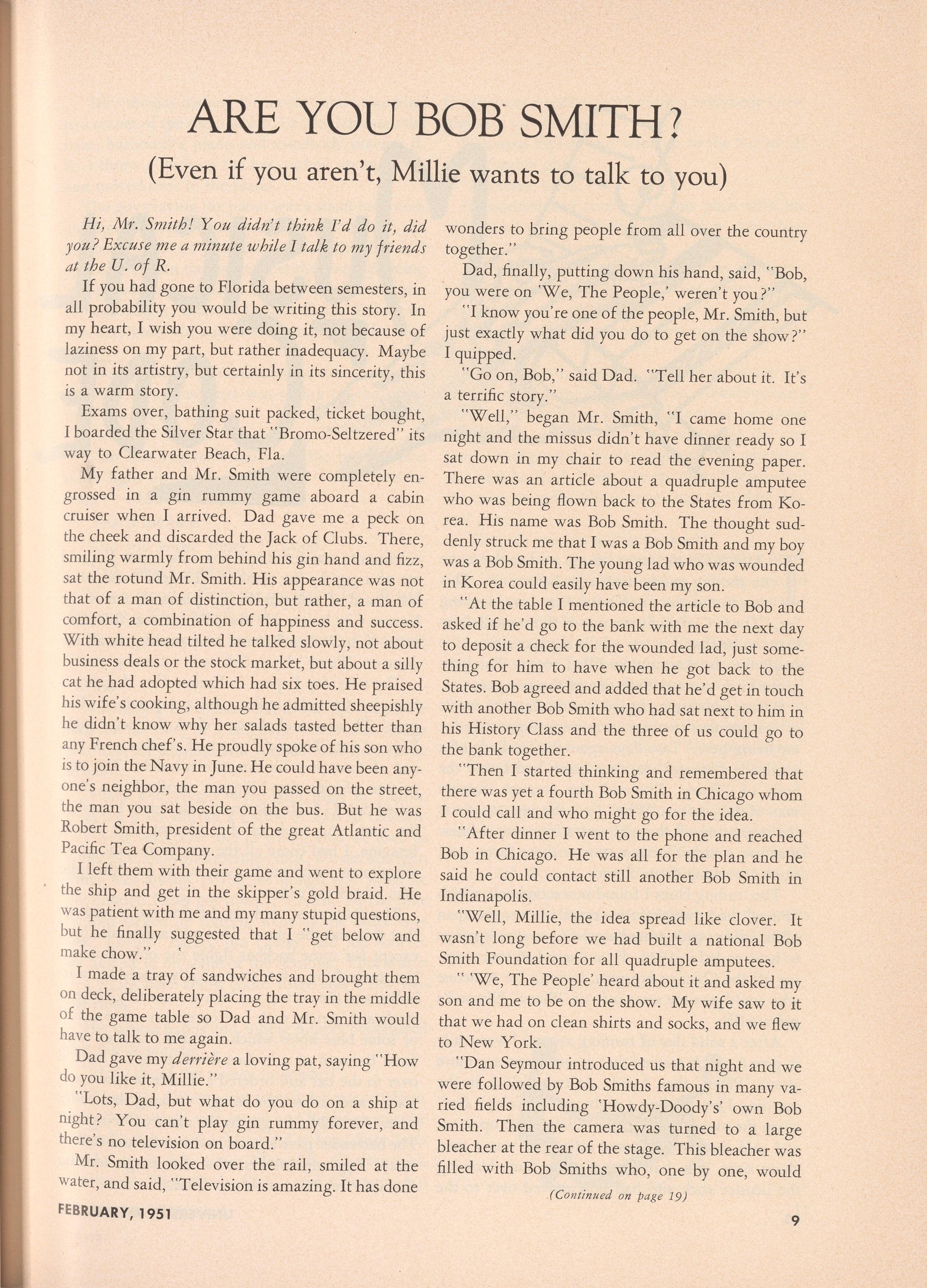
ARE YOU BOB . SMITH?
(Even if you aren't, Millie wants to talk to you)
Hi, Mr. Smith! You didn't think I'd do it, did you? Excuse me a minute while I talk to my friends at the U. of R.
If you had gone to Florida between semesters, in all probability you would be writing this story. In my heart, I wish you were doing it, not because of laziness on my part, but rather inadequacy. Maybe not in its artistry, but certainly in its sincerity, this is a warm story.
Exams over, bathing suit packed, ticket bought, I boarded the Silver Star that "Bromo-Seltzered" its w ay to Clearwater Beach, Fla .
My father and Mr. Smith were completely eng rossed in a gin rummy game aboard a cabin cruiser when I arrived. Dad gave me a peck on the cheek and discarded the Jack of Clubs. There, smiling warmly from behind his gin hand and fizz, sat the rotund Mr. Smith. His appearance was not that of a man of distinction, but rather, a man of comfort, a combination of happiness and success. W ith white head tilted he talked slowly, not about business deals or the stock market, but about a silly cat he had adopted which had six toes. He praised his wife's cooking, although he admitted sheepishly he didn't know why her salads tasted better than any French chef's. He proudly spoke of his son who is to join the Navy in June. He could have been anyone' s neighbor, the man you passed on the street , th e man you sat beside on the bus. But he was Robert Smith, president of the great Atlantic and Pacific Tea Company.
I left them with their game and went to explore the ship and get in the skipper's gold braid. He was patient with me and my many stupid questions, but he finally suggested that I "get below and make chow." '
I made a tray of sandwiches and brought them on deck, deliberately placing the tray in the middle of the game table so Dad and Mr. Smith would have to talk to me again.
Dad gave my derriere a loving pat, saying "How do you like it, Millie."
" Lots, Dad, but what do you do on a ship at night? You can't play gin rummy forever, and there's no television on board."
Mr. Smith looked over the rail, smiled at the water, and said, "Television is amazing. It has done FEBRUARY, 1951
wonders to bring people from all over the country together."
Dad, finally, putting down his hand, said, "Bob, you were on 'We, The People,' weren't you?"
"I know you're one of the people, Mr. Smith, but just exactly what did you do to get on the show?" I quipped.
·
"Go on, Bob," said Dad. "Tell her about it. It's a terrific story."
"Well," began Mr. Smith, "I came home one night and the missus didn't have dinner ready so I sat down in my chair to read the evening paper. There was an article about a quadruple amputee who was being flown back to the States from Korea. His name was Bob Smith. The thought suddenly struck me that I was a Bob Smith and my boy was a Bob Smith. The young lad who was wounded in Korea could easily have been my son.
"At the table I mentioned the article to Bob and asked if he ' d go to the bank with me the next day to deposit a check for the wounded lad, just something for him to have when he got back to the States. Bob agreed and added that he'd get in touch with another Bob Smith who had sat next to him in his History Class and the three of us could go to the bank together.
"Then I started thinking and remembered that there was yet a fourth Bob Smith in Chicago whom I could call and who might go for the idea.
"After dinner I went to the phone and reached Bob in Chicago. He was all for the plan and he said he could contact still another Bob Smith in Indianapolis.
"Well, Millie, the idea spread like clover. It wasn't long before we had built a national Bob Smith Foundation for all quadruple amputees.
" 'We, The People' heard about it and asked my son and me to be on the show. My wife saw to it that we had on clean shirts and socks, and we flew to New York.
"Dan Seymour introduced us that night and we were followed by Bob Smiths famous in many varied fields including 'Howdy-Doody's' own Bob Smith. Then the camera was turned to a large bleacher at the rear of the stage. This bleacher was filled with Bob Smiths who, one by one, would (Co ntinued on p ag e 19)
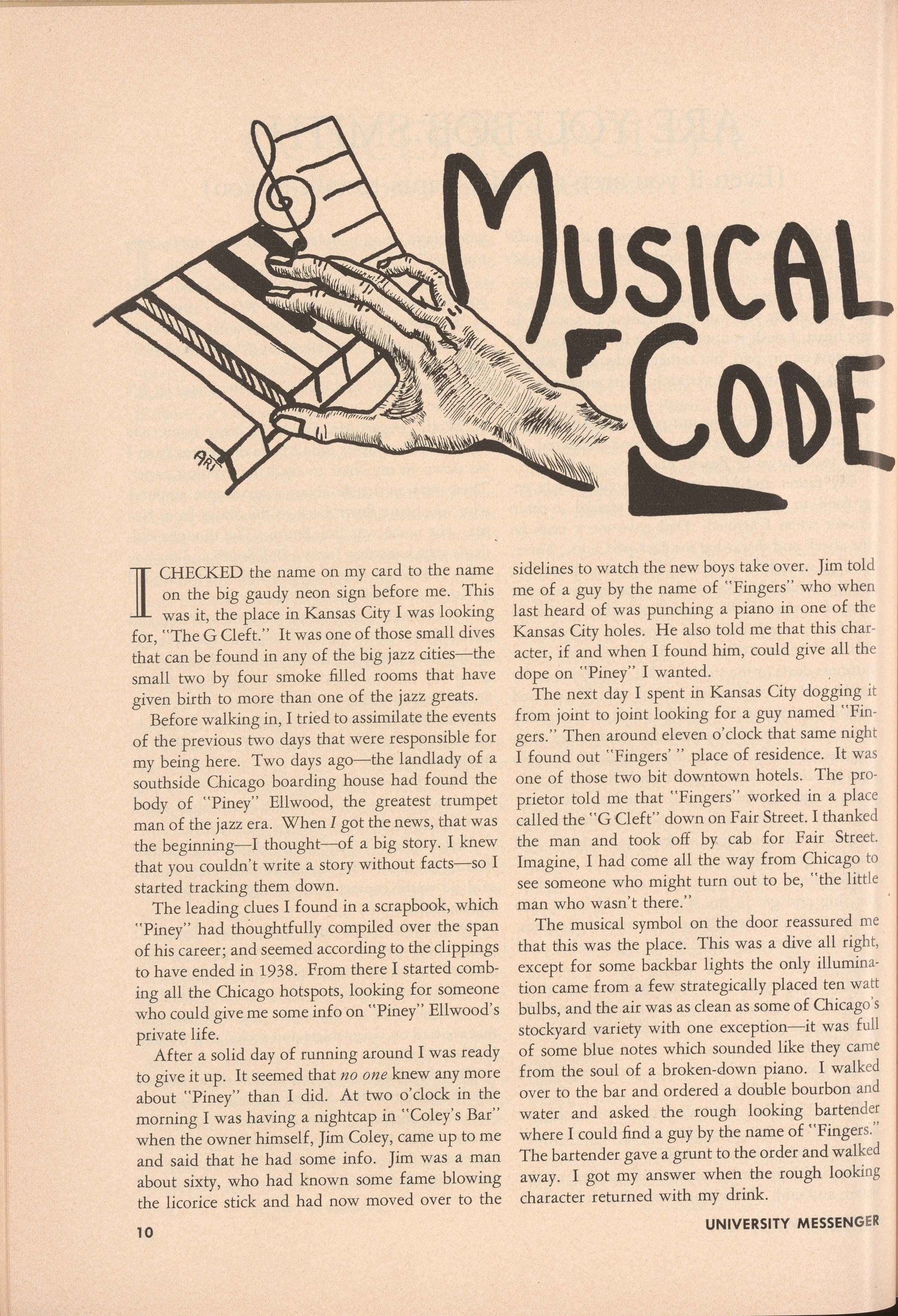
ICHECKED the name on my card to the name on the big gaudy neon sign before me This was it , the place in Kansas City I was looking for, " The G Cleft. " It was one of those small dives that can be found in any of the big jazz cities-the small two by four smoke filled rooms that have given birth to more than one of the jazz greats.
Before walking in, I tried to assimilate the events of the previous two days that were responsible for my being here. Two days ago- the landlady of a southside Chicago boarding house had found the body of " Piney " Ellwood , the greatest trumpet man of the jazz era. When I got the news, that was the beginning-I thought-of a big story. I knew that you couldn ' t write a story without facts-so I started tracking them down.
The leading clues I found in a scrapbook, which " Piney" had thoughtfully compiled over the span of his career; and seemed according to the clippings to have ended in 1938. From there I started combing all the Chicago hotspots, looking for someone who could give me some info on "Piney " Ellwood ' s private life.
After a solid day of running around I was ready to give it up. It seemed that no one knew any more about "Piney" than I did. At two o'clock in the morning I was having a nightcap in "Coley's Bar" when the owner himself, Jim Coley, came up to me and said that he had some info Jim was a man about sixty, who had known some fame blowing the licorice stick and had now moved over to the 10
sidelines to watch the new boys take over. Jim tol d me of a guy by the name of " Fingers " who whe n last heard of was punching a piano in one of th e Kansas City holes. He also told me that this character, if and when I found him , could give all th e dope on " Piney " I wanted .
The next day I spent in Kansas City doggin g it from joint to joint looking for a guy named "Fi ngers. " Then around eleven o ' clock that same nig ht I found out " Fingers ' " place of residence. It was one of those two bit downtown hotels. The p roprietor told me that " Fingers" worked in a pla ce called the " G Cleft" down on Fair Street. I thank ed the man and took off by cab for Fair Street. Imagine, I had come all the way from Chicago to see someone who might turn out to be , "the lit tle man who wasn ' t there. "
The musical symbol on the door reassured me that this was the place. This was a dive all right, except for some backbar lights the only illumi nation came from a few strategically placed ten watt bulbs, and the air was as clean as some of Chicago's stockyard variety with one exception- it was full of some blue notes which sounded like they came from the soul of a broken-down piano . I wal ked over to the bar and ordered a double bourbon and water and asked the rough looking barten der where I could find a guy by the name of "Finge r s." The bartender gave a grunt to the order and wal ked away. I got my answer when the rough looking character returned with my drink.
UNIVERSITYMESSENGER

"He's the guy making the music," and he nodded t o a corner of the room which, I noticed through the h aze, harbored a piano and somebody playing it. So I threw a buck on the bar, picked up my drink and moved over to the piano.
The guy playing the piano was a small man with 2-n angular face that had a constant frown in the forehead, and two eyes that looked like they had seen and known too much. Yet they were piercing and paradoxically soft as those of a deer who, perceiving danger, is about to take flight. I'd say he wa s fifty years old and looked ten years older than th at.
He stopped for a moment to down the amber contents of a glass that was .sitting on the piano next to a gold watch.
" Are you 'Fingers'?"
With that inquiry I could see the big question mar k light up--who is this guy ?-what does he want ?-what's his angle ?
" That's the title."
" Did you know 'Piney' Ellwood?"
" Yea, what's it to you? "
' Tm a reporter from the magazine Jazz World , the name's Ted Cervick and ... "
" And you want to know the beat of the tune ' Piney' played is that it?"
((Yes."
Not taking his eyes or hands off the piano, he told me his story in a language which uses sharps ~nd flats for commas and periods-the man spoke m mu sic.
"Pi ney and myself were both born in Dallas, then the folks shifted a couple of bars to Orleans . We were very poor and as young kids we used to whip rhythms with shoeshine rags.We did all right, Piney was always saving his dough and when he got enough Piney got himself a horn. By the time he had racked up sixteen, some of the older boys like "Curley" Banks, Jim Colely, and Joe Soolvec let him sit in on some of the sessions. That was it -a chord here and a chord there and a few two bar rides."
His strong hands and supple fingers punctuated this last statement.
"H ow about the money he made?"
"M oney ?-Piney never tooted for money alone. His whole world was music and his horn was the gimmick that opened this world to him. Sure, later on he made big time, Memphis, Chattanooga, Baltimore, New York, K. C., and Chicago-but FEBRUARY, 1951
the guy was a sucker for the blues, everybody knew him as a soft touch."
I excused myself and went up to the bar to fill up his empty glass.
"Bourbon, 0. K. ?"
He nodded and reached for his glass with the right hand while the left played a low down bass melody.
"What about the argument with his brotherhear they didn't talk to each other-over twenty years?"
Fingers froze for a second, gave me a good look, then continued.
"Oh yea, his brother-a no good kid-got sick of coming in on the second chorus. Always playing counterpoint to Piney. Piney didn't mind, he played the melody straight-no sour notes, all the rest played background. From about 1921 to whenever you said he died, Piney always played lead-and the music sounded like it came from the other side, real gone.''
"How do you know Piney's dead?"
"He must be or else you'd be swapping notes with Piney himself. He loved to pick up second choruses and spend the night reminiscing, sort of a dreamer-like that from a kid."
I was playing with the watch I had picked up off the old "upright." When I flipped it over I noticed the inscription on the back side, it read-"To K. E. from Piney." When Fingers finished I gave him a quizzical look, he just looked back stony eyed. Fingers switched the music from "Memphis Night" to "My Man," Piney's theme, and said, "That's it, Jack."
I got up, thanked him for the chitchat and started to walk out, stopping at the bar and plunking down a twenty-to insure Fingers a supply of " Carousel Water," then I wormed my way to the door and walked out.
It was worth the plane trip down and the hours of searching-I had gotten my story. All I had to do was-decipher it.

THISWORLD OF MINE
THE FILAMENT in the overhead bulb died to an orange glow and then winked out. I was watching it with half-closed eyes, but now I am completely awake and filled with a profound loneliness. I am the only human being left in the world out of the millions who were here yesterday. Yesterday they talked , walked, read the paper , watched TV Today they are gone - in one moment. Now the only companions that I have are phantasms of my imagination like you I reali z e that's what you are, but I'm going home now. Come along with me. You 'll be bored but come along anyway. You 'll like my family.
Outside the wind blows in cool-warm gusts and swirls the street litter into clouds Here and there a car is overturned and ruined by its sudden lack of a driver. A few houses are beginning to smoulder menacingly where someone has left an iron on or a half-smoked , deserted cigarette touches paper. The main power is off now so that's one less danger
Here's a kitten at my feet complaining bitterl y. Must have missed his breakfast. He ' ll either have to learn to take care of himself soon or starve. Like the kitten, most of the now-gone population w as pampered . they didn ' t need to be independ ent. Dependent with friends; independent and with out them . I used to believe that independence was one of the primary virtues, but in the past few minutes that belief has been regretted an incommensurable number of times None of my companions were without foibles, but believe me, phantasm , the y were flesh and blood. But I've hurt your feelings! Let's find a car and start home now It is not very far.
The breeze is stirring up more debris now. The sun is shining feebly through the dust. There is no particular sound except the skittering of a paper across the pavement Just as a passing thought .. how many kittens are unfortunate enough to be shut in the houses with no hope for escape? I can hardly open every door in the world. That makes five locked cars. Surely somebody was careless enough to leave his keys. Yes, here in this Cadillac and what a beauty! Maroon with a pale cream top. I always wanted a Cadillac and now it's mine. Why did I want one? Just to show off I suppose , certainly 12
there ' s nobody to show it to. Hmm . . the mot or has a powerful purr
The tires are singing over the surface of th e highway. I keep hoping that the next hilltop is hiding a car full of people speeding toward us. But there is nothing, no one left. The speedomet er shows seventy-five as a meandering cow eyes me with disapproval. No patrolmen , nobody to h it, only myself to risk. Sad state of affairs when the re is only a cow to register disapproval.
What are you pointing at , phantasm ? It's on ly a billboard showing Perry Como with a cigarett e. Cigarette? Why did you show me? I had forgott en but I need one now. It seems like a long time since I smoked one. Odd how a habit is forgotten a nd then one small sign can bring it back all over ag ain. There ' s not a soul left now so they' re mine for the taking. Here ' s a filling station I'll just break t he window and help myself ..
Well of all things! This drawbridge is op en, phantasm. What'll we do now , let it down? Ho w? It's electric and the power is off. Those cables are so thick that we ' d ne v er be able to cut throu gh them What obstacles man-made short cuts are when man is gone. But it's only an obstacle because I won't part with the convenience of this car. Maybe there ' s a road map somewhere in the car . If so we can find a way around it
How many hours now ? I ran out of gas and had to take another car. It's not a Cadillac but it ru ns. But there ' s my home now! I can see the town w ater tank over the trees ahead Will it be like all the other towns-deserted , with the smoke of untended fires curling toward the empty sky? N o, I vaguely see a car and people Yes, I'm almost h ome now and the people are still here . At long l ast, friends
Phantasm , what are the people saying? I see the chief of police, and there's Beth, my girl. Th ey're pointing now and talking about somebody who stole two cars They don ' t seem to realize that they ' re the only people left in the world. They must be crazy, phantasm, not to be able to see any farth er than their noses. But come, we ' re going home now. You'll like my family .
- DICK SMIT H UNIVERSITYMESSENGER
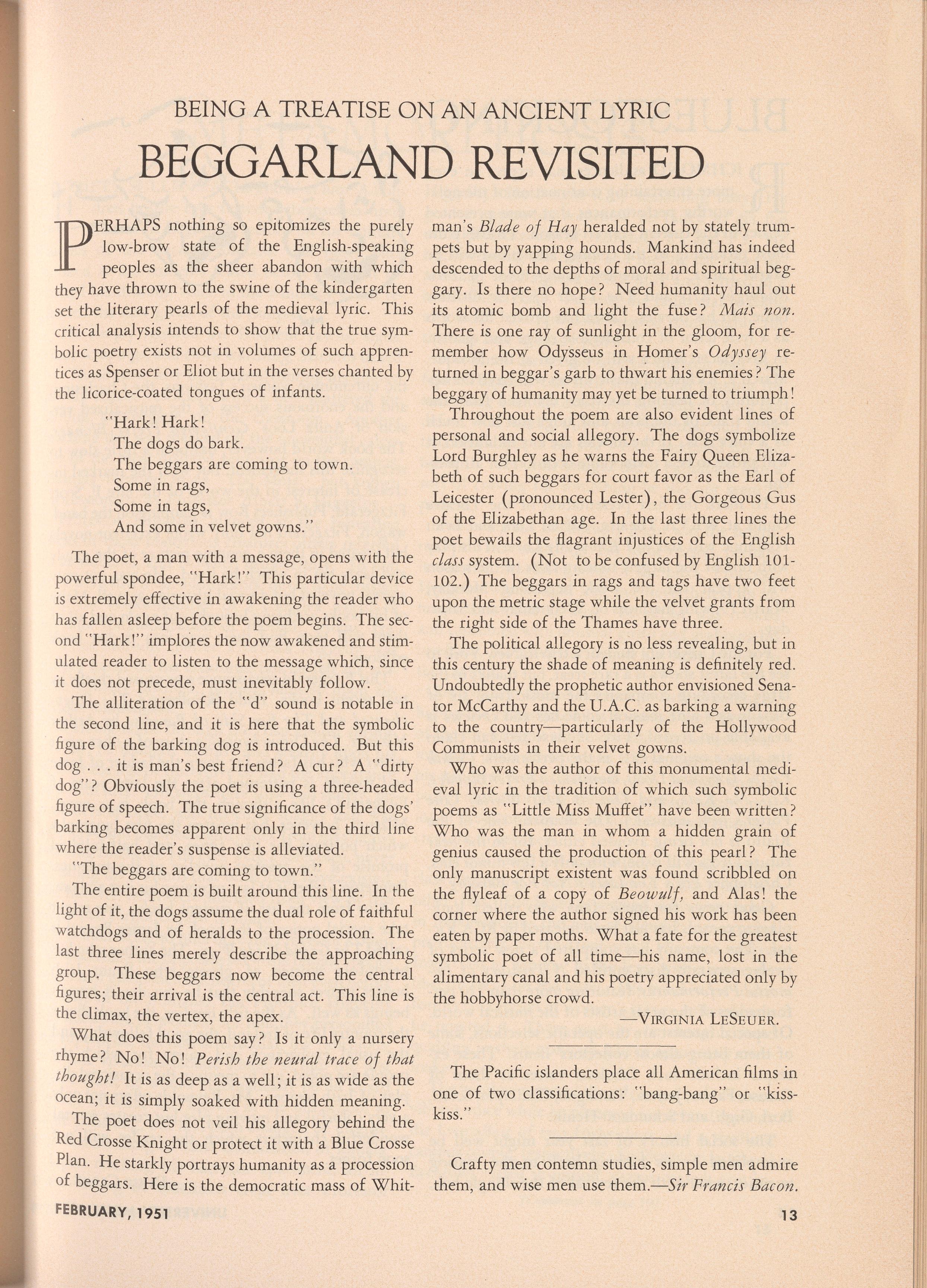
BEING A TREATISE ON AN ANCIENT LYRIC
BEGGARLANDREVISITED
PERHAPS nothing so epitomizes the purely low-brow state of the English-speaking peoples as the sheer abandon with which they have thrown to the swine of the kindergarten set the literary pearls of the medieval lyric. This critical analysis intends to show that the true symbolic poetry exists not in volumes of such apprentices as Spenser or Eliot but in the verses chanted by the licorice-coated tongues of infants
" Hark! Hark!
The dogs do bark
The beggars are coming to town.
Some in rags, Some in tags, And some in velvet gowns."
The poet, a man with a message, opens with the powerful spondee, "Hark!" This particular device is extremely effective in awakening the reader who has fallen asleep before the poem begins The second " Hark!" implores the now awakened and stimulate d reader to listen to the message which, since it does not precede , must inevitably follow.
The alliteration of the "d" sound is notable in the second line, and it is here that the symbolic figure of the barking dog is introduced. But this dog ... it is man's best friend? A cur? A "dirty dog"? Obviously the poet is using a three-headed figure of speech. The true significance of the dogs' barking becomes apparent only in the third line where the reader's suspense is alleviated.
"T he beggars are coming to town."
The entire poem is built around this line . In the ligh t of it, the dogs assume the dual role of faithful watch dogs and of heralds to the procession. The last three lines merely describe the approaching grou p. These beggars now become the central figures; their arrival is the central act. This line is the climax, the vertex, the apex.
What does this poem say? Is it only a nursery rhyme? No! No! Perish the neural trace of that thought ! It is as deep as a well; it is as wide as the ocean; it is simply soaked with hidden meaning.
The poet does not veil his allegory behind the Red Crosse Knight or protect it with a Blue Crosse Plan. He starkly portrays humanity as a procession of beggars. Here is the democratic mass of WhitFEBRUARY, 1951
man ' s Blade of Hay heralded not by stately trumpets but by yapping hounds. Mankind has indeed descended to the depths of moral and spiritual beggary. Is there no hope? Need humanity haul out its atomic bomb and light the fuse? Mais non. There is one ray of sunlight in the gloom, for remember how Odysseus in Homer's Odyssey returned in beggar's garb to th~art his enemies? The beggary of humanity may yet be turned to triumph!
Throughout the poem are also evident lines of personal and social allegory. The dogs symbolize Lord Burghley as he warns the Fairy Queen Elizabeth of such beggars for court favor as the Earl of Leicester (pronounced Lester), the Gorgeous Gus of the Elizabethan age. In the last three lines the poet bewails the flagrant injustices of the English class system. (Not to be confused by English 101102.) The beggars in rags and tags have two feet upon the metric stage while the velvet grants from the right side of the Thames have three.
The political allegory is no less revealing, but in this century the shade of meaning is definitely red. Undoubtedly the prophetic author envisioned Senator McCarthy and the U.A.C. as barking a warning to the country-particularly of the Hollywood Communists in their velvet gowns.
Who was the author of this monumental medieval lyric in the tradition of which such symbolic poems as "Little Miss Muff et" have been written? Who was the man in whom a hidden grain of genius caused the production of this pearl? The only manuscript existent was found scribbled on the flyleaf of a copy of Beowulf, and Alas! the corner where the author signed his work has been eaten by paper moths. What a fate for the greatest symbolic poet of all time--his name, lost in the alimentary canal and his poetry appreciated only by the hobbyhorse crowd.
-VIRGINIA LESEUER.
The Pacific islanders place all American films_in one of two classifications: "bang-bang" or "kisskiss."
Crafty men contemn studies, simple men admire them, and wise men use them .-Sir Francis Bacon.
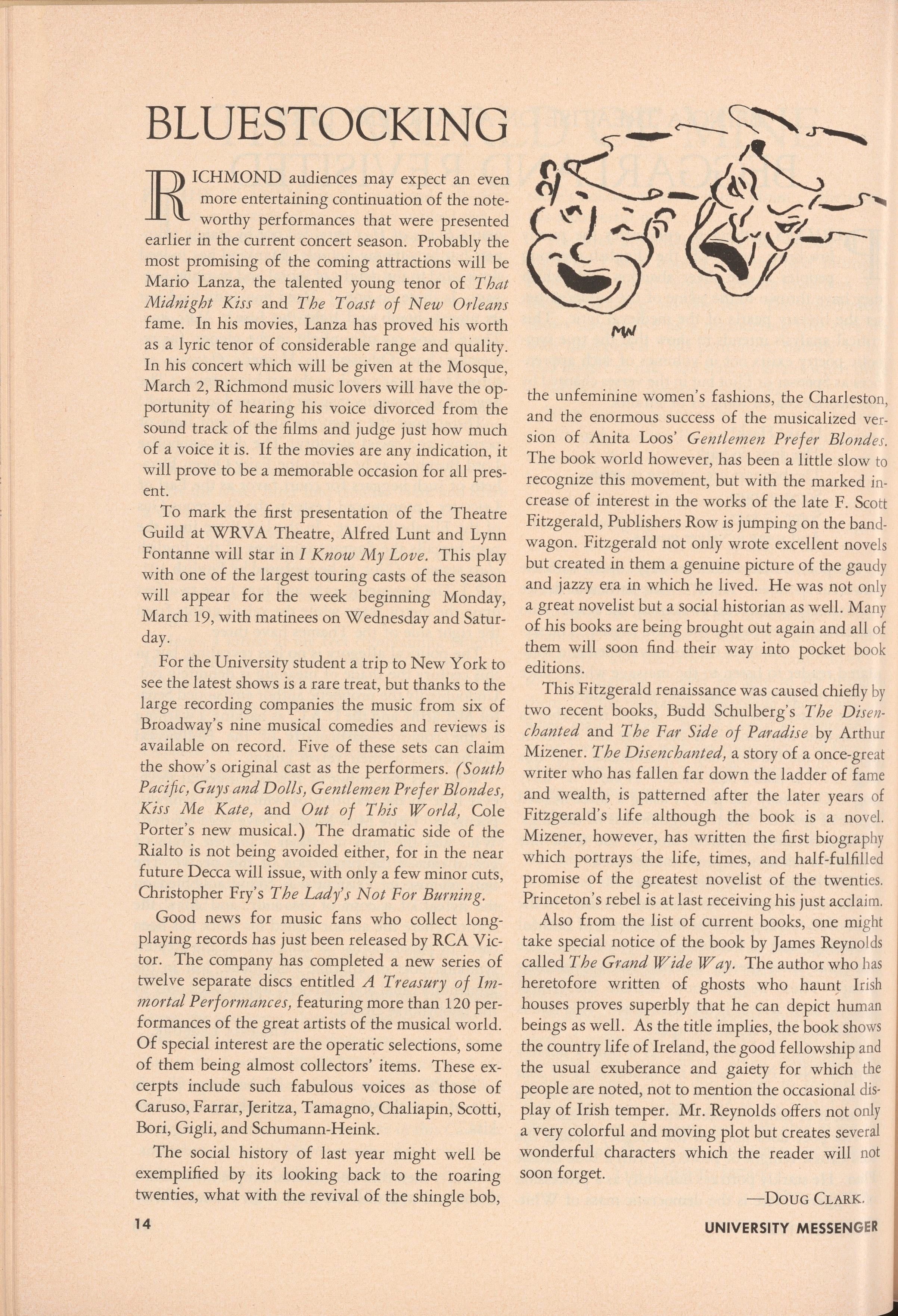
BLUESTOCKING
RICHMOND audiences may expect an even more entertaining continuation of the noteworthy performances that were presented earlier in the current concert season. Probably the most promising of the coming attractions will be Mario Lanza, the talented young tenor of That Midnight Kiss and The Toast of New 0fleans fame. In his movies, Lanza has proved his worth as a lyric tenor of considerable range and quality . In his concert which will be given at the Mosque, March 2, Richmond music lovers will have the opportunity of hearing his voice divorced from the sound track of the films and judge just how much of a voice it is. If the movies are any indication , it will prove to be a memorable occasion for all present.
To mark the first presentation of the Theatre Guild at WRVA Theatre, Alfred Lunt and Lynn Fontanne will star in I Know My Lov e This play with one of the largest touring casts of the season will appear for the week beginning Monday, March 19, with matinees on Wednesday and Saturday.
For the University student a trip to New York to see the latest shows is a rare treat, but thanks to the large recording companies the music from six of Broadway's nine musical comedies and reviews is available on record. Five of these sets can claim the show's original cast as the performers. (South Pacific, Guys and Dolls , Gentlemen Prefef Blondes , Kiss Me Kate, and Out of This World , Cole Porter's new musical.) The dramatic side of the Rialto is not being avoided either, for in the near future Decca will issue, with only a few minor cuts, Christopher Fry's The Lady's Not For Burning.
Good news for music fans who collect longplaying records has just been released by RCA Victor. The company has completed a new series of twelve separate discs entitled A Treasury of Immortal Perfornzances, featuring more than 120 performances of the great artists of the musical world. Of special interest are the operatic selections, some of them being almost collectors' items. These excerpts include such fabulous voices as those of Caruso, Farrar, Jeritza, Tamagno, Chaliapin, Scotti, Bori, Gigli, and Schumann-Heink
The social history of last year might well be exemplified by its looking back to the roaring twenties, what with the revival of the shingle bob, 14
the unfeminine women's fashions, the Charlesto n, and the enormous success of the musicalized version of Anita Loos' Gentlemen Prefer Blond es
The book world however, has been a little slow to recognize this movement, but with the marked increase of interest in the works of the late F. Scott Fitzgerald, Publishers Row is jumping on the ban dwagon. Fitzgerald not only wrote excellent novels but created in them a genuine picture of the gau dy and jazzy era in which he lived. He was not only a great novelist but a social historian as well. Ma ny of his books are being brought out again and all of them will soon find their way into pocket book editions.
This Fitzgerald renaissance was caused chiefly by two recent books, Budd Schulberg's The Dis enchanted and Th e Far Side of Paradise by Arth ur Mizener. The Dis enchanted, a story of a once-great writer who has fallen far down the ladder of fa me and wealth, is patterned after the later years of Fitzgerald's life although the book is a no vel. Mizener, however, has written the first biograp hy which portrays the life, times, and half-fulfill ed promise of the greatest novelist of the twent ies. Princeton's rebel is at last receiving his just acclaim.
Also from the list of current books, one might take special notice of the book by James Reynolds called The Grand Wide Way. The author who has heretofore written of ghosts who haunt Ir ish houses proves superbly that he can depict hum an beings as well. As the title implies, the book shows the country life of Ireland, the good fellowship and the usual exuberance and gaiety for which the people are noted, not to mention the occasional display of Irish temper. Mr. R eynolds offers not only a very colorful and moving plot but creates several wonderful ch aracters which th e reader will not soon forget.
- D OUG CLARK , UNIVERSITYMESSENGER

METAMORPHOSIS
FIFTY SULLEN FACES glared at him. A hundred hostile eyes f~stened themselves_~pon him as he began his lecture on the military tactics of the ancient Romans. He never once looked at the students seated before him, but directed his droning voice to the windows which reflected the new green of the campus.
He simply ignored the frequent yawns, sighs, chair scrapings, and clock watching. Minutes ticked by. Those same fifty figures confronting his uneven profile stirred restlessly until a bell shattered the stifling atmosphere of the classroom. Another teaching day was marked off the uneventful calendar of the most disliked professor on the campus, jokingly referred to as "The Mole, " but known professionally as Professor Albert S. Higgelby.
Professor Higgelby glanced at the retreating backs of those obnoxious creatures others referred to as students, and frowned distastefully To him they were still mere adolescents, ne ver to be trusted with the responsibilities of a complex world-a juvenile conglomeration of football , proms , fraternities, and idle chatter. Professor Higgelby was indeed harsh on his creatures , but he felt his attitude entirely justified, priding himself upon his serious-mindedness.
Wa lking home through the crisp almost springlike air , he thought intently and wearily upon his life. At the age of thirty-five he had the appearance of a man fifty. His steps were slow and stately, his shoulders stooped , and his curly shaggy hair was lacquered and brushed tightly back from his slightly receding forehead. His eyes w ere a steel blue, never revealing the warmth that once must have existed , and his even teeth were shielded from view by lips which h ad forgotten how to smile.
It is interesting to note here the Professor ' s opinion concerning the opposite sex- the female species which had gladdened the hearts of men even before the days of the Romans. But Professor Higgelby was not aware of women ; for him they personified the superficial, the non-intellectual , the ridiculous If a cute vivacious blonde smiled at him the first day of class, he would automatically be on guard for any of what was known in the old school as ~pple polishing, but had been changed by disgustmg modern slang to some combination of initials.
Upon reaching his bachelor apartment, an intense f eeling of loneliness crept over Professor FEBRUARY, 1951
Higgelby. He fought it by remaining busy. He graded papers but somehow he failed to get the usual pleasure out of recording E's and F's. He began reading the paper and finding the news depressing, fixed a glass of hot milk and settled in a comfortable chair. Turning the radio dial to some soft music, the professor relaxed comfortably for the first time in many years.
Not since the tender age of thirteen had Professor Higgelby felt such sentimental longing for something even his extensive vocabulary could not define For weeks, there had been that dull ache, that blank spot in his life which had cried for fulfillment. Not until tonight did it culminate into a sort of craving for something he did not seem to possess.
Following the melancholy night was the brightness of a new morning. For some reason, perhaps it was the melodious song of the birds, Professor Higgelby whistled off key, but nevertheless an attempt was made at song Breakfast was cooked and consumed with unusual gusto and grabbing his briefcase, the professor began his daily trudge to the campus.
Perspiration caused his hair to curl charmingly, hiding the recession of his forehead and the glare of the sun brought about a twinkle in his eyes, erasing their usual distant stare. Curious eyes watched his progress from classroom door to desk and he pulled uncomfortably at his tie, already askew , noting at the same time the looks that passed from one creature to another.
The bell rang, roll was called, and thus another class beginning . But somehow it wasn ' t just another class. The Romans seemed almost secondary in importance to the pair of slender legs crossed provocatively on the front row. His eyes strayed from class to window to the legs, with a more deliberate focus on the latter. His mind raced to his former conception of women's status , and suddenly he rejected it. There must be, he thought, some qualities in their make-up I have apparently overlooked
The window received the sole impact ofhis more vibrant voice while he observed for several seconds ' the love affair of two frisky dogs, and a strolling campus couple, respectively. Suddenly he laughed! Eyebrows raised in unison, yawns ceased, eyes re-
(Continued on pag e 19)
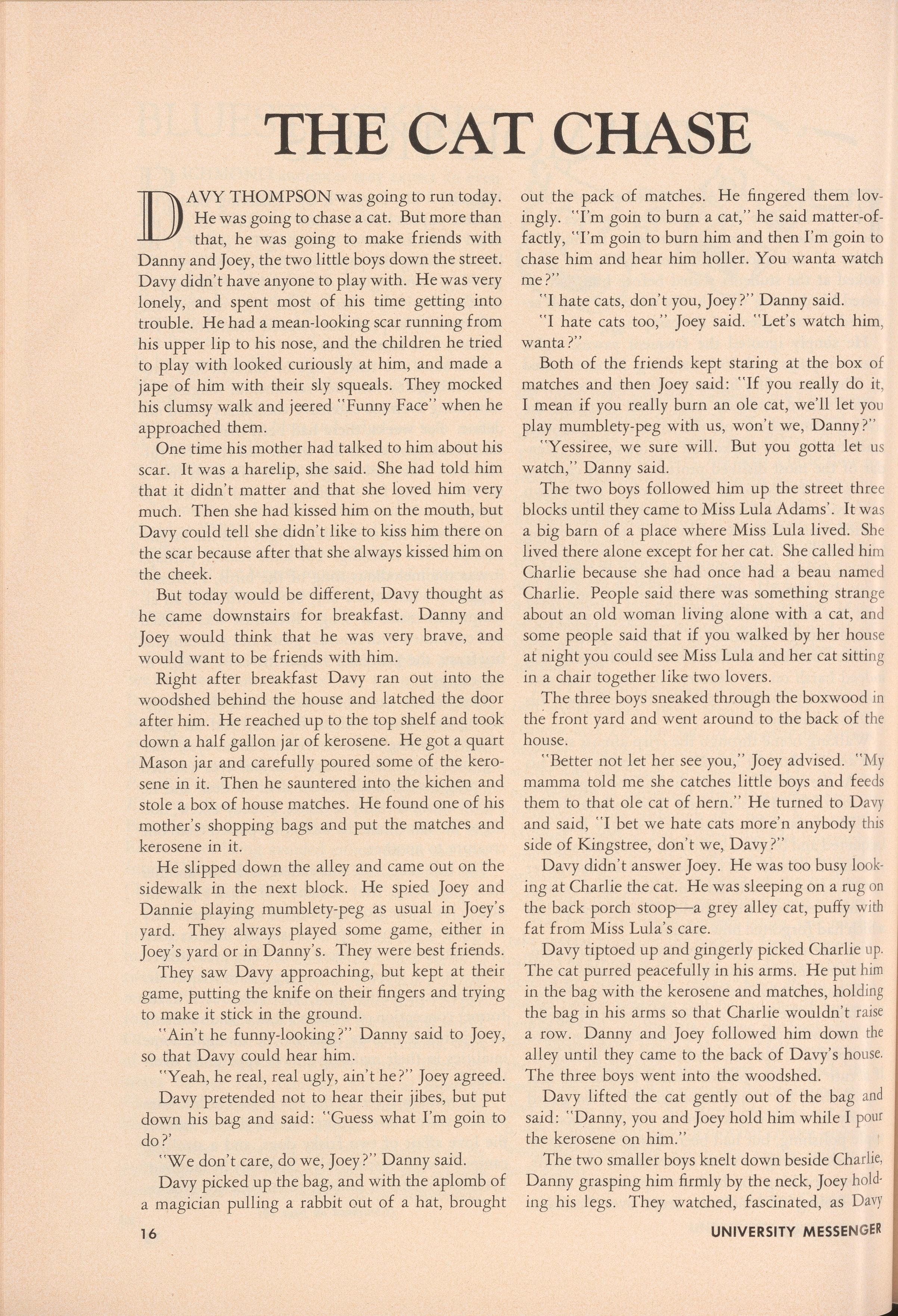
THE CAT CHASE
DAVY THOMPSON was going to run today. He was going to chase a cat. But more than that, he was going to make friends with Danny and Joey, the two little boys down the street. Davy didn't have anyone to play with. He was very lonely, and spent most of his time getting into trouble. He had a mean-looking scar running from his upper lip to his nose, and the children he tried to play with looked curiously at him, and made a jape of him with their sly squeals. They mocked his clumsy walk and jeered "Funny Face" when he approached them.
One time his mother had talked to him about his scar. It was a harelip, she said. She had told him that it didn't matter and that she loved him very much. Then she had kissed him on the mouth, but Davy could tell she didn ' t like to kiss him there on the scar because after that she always kissed him on the cheek.
But today would be different, Davy thought as he came downstairs for breakfast. Danny and Joey would think that he was very brave, and would want to be friends with him.
Right after breakfast Davy ran out into the woodshed behind the house and latched the door after him. He reached up to the top shelf and took down a half gallon jar of kerosene. He got a quart Mason jar and carefully poured some of the kerosene in it. Then he sauntered into the kichen and stole a box of house matches. He found one of his mother's shopping bags and put the matches and kerosene in it.
He slipped down the alley and came out on the sidewalk in the next block. He spied Joey and Dannie playing mumblety-peg as usual in Joey's yard. They always played some game, either in Joey's yard or in Danny's. They were best friends.
They saw Davy approaching, but kept at their game, putting the knife on their fingers and trying to make it stick in the ground.
"Ain't he funny-looking?" Danny said to Joey, so that Davy could hear him.
" Yeah, he real, real ugly, ain't he?" Joey agreed. Davy pretended not to hear their jibes, but put down his bag and said: "Guess what I'm goin to do?'
"We don't care, do we, Joey?" Danny said. Davy picked up the bag, and with the aplomb of a magician pulling a rabbit out of a hat, brought 16
out the pack of matches. He fingered them lovingly. 'Tm goin to burn a cat," he said matter-offactly, 'Tm goin to burn him and then I'm goin to chase him and hear him holler. You wanta watch 1"me.
"I hate cats, don't you, Joey? " Danny said.
"I hate cats too," Joey said. "Let's watch him , wanta ?"
Both of the friends kept staring at the box of matches and then Joey said: "If you really do it , I mean if you really burn an ole cat, we'll let you play mumblety-peg with us, won ' t we, Danny? "
" Y essiree, we sure will. But you gotta let us watch," Danny said.
The two boys followed him up the street thre e blocks until they came to Miss Lula Adams'. It w as a big barn of a place where Miss Lula lived. She lived there alone except for her cat. She called hi m Charlie because she had once had a beau nam ed Charlie. People said there was something stran ge about an old woman living alone with a cat, and some people said that if you walked by her hou se at night you could see Miss Lula and her cat sitti ng in a chair together like two lovers.
The three boys sneaked through the boxwood in the front yard and went around to the back of the house.
"Better not let her see you," Joey advised. "My mamma told me she catches little boys and fe eds them to that ole cat of hem ." He turned to D avy and said, " I bet we hate cats more ' n anybody this side of Kingstree, don't we, Davy?"
Davy didn't answer Joey. He was too busy looking at Charlie the cat. He was sleeping on a ru g on the back porch stoop-a grey alley cat, puffy with fat from Miss Lula's care.
Davy tiptoed up and gingerly picked Charlie up. The cat purred peacefully in his arms. He put him in the bag with the kerosene and matches, hold ing the bag in his arms so that Charlie wouldn't raise a row. Danny and Joey followed him down the alley until they came to the back of Davy's ho use. The three boys went into the woodshed.
Davy lifted the cat gently out of the bag and said: "Danny, you and Joey hold him while I pour the kerosene on him."
The two smaller boys knelt down beside Charlie, Danny grasping him firmly by the neck, Joey hold· ing his legs. They watched, fascinated, as Davy UNIVERSITY MESSENGER
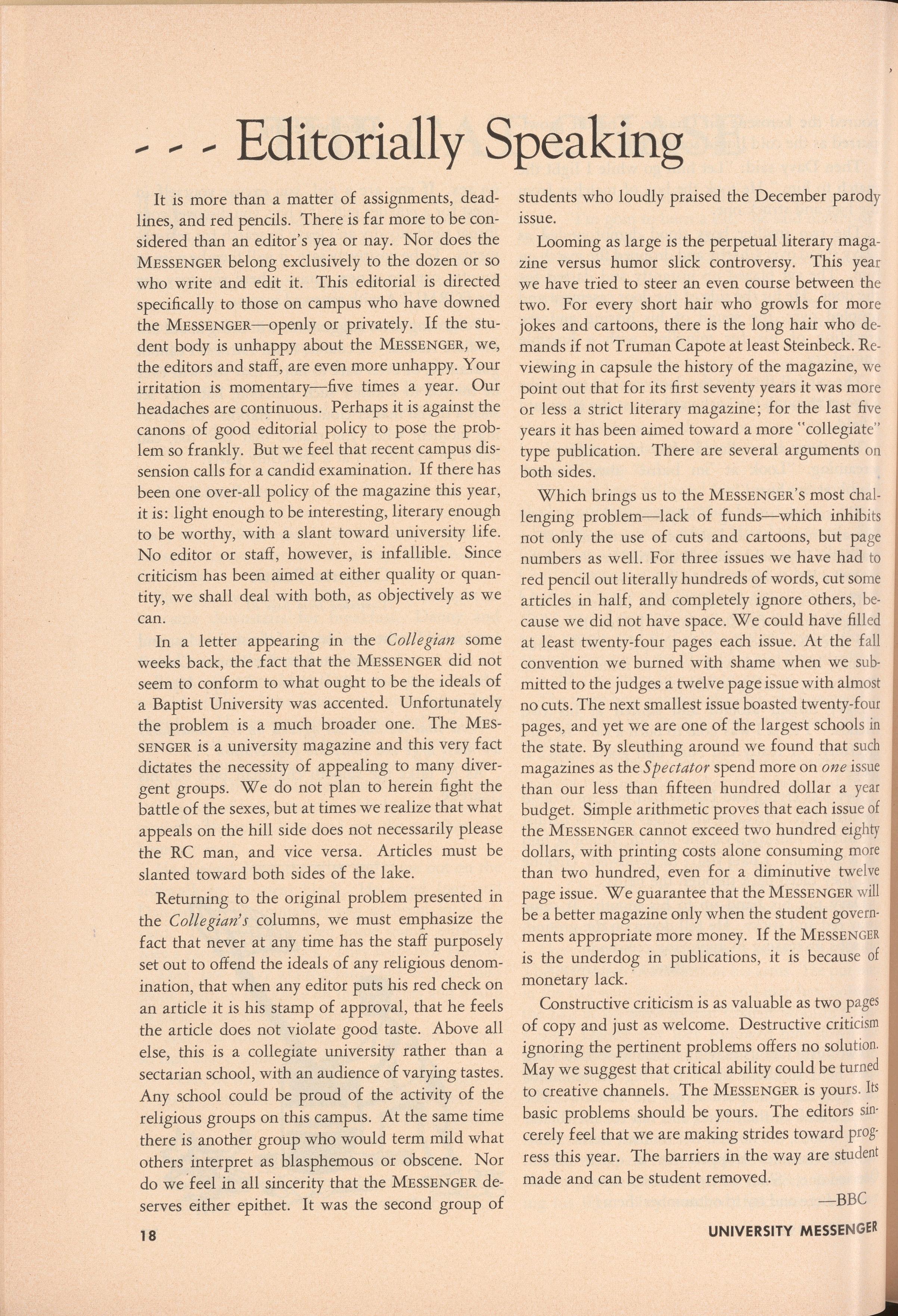
Editorially Speaking
It is more than a matter of assignments, deadlines, and red pencils. There is far more to be considered than an editor's yea or nay. Nor does the MESSENGERbelong exclusively to the dozen or so who write and edit it. This editorial is directed specifically to those on campus who have downed the MESSENGER-openly or privately. If the student body is unhappy about the MESSENGER 1 we, the editors and staff, are even more unhappy. Your irritation is momentary-five times a year. Our headaches are continuous. Perhaps it is against the canons of good editorial policy to pose the problem so frankly. But we feel that recent campus dissension calls for a candid examination. If there has been one over-all policy of the magazine this year, it is: light enough to be interesting, literary enough to be worthy, with a slant toward university life . No editor or staff, however, is infallible. Since criticism has been aimed at either quality or quantity, we shall deal with both, as objectively as we can.
In a letter appearing in the Collegian some weeks back, the .fact that the MESSENGERdid not seem to conform to what ought to be the ideals of a Baptist University was accented. Unfortunately the problem is a much broader one. The MESSENGERis a university magazine and this very fact dictates the necessity of appealing to many divergent groups. We do not plan to herein fight the battle of the sexes, but at times we realize that what appeals on the hill side does not necessarily please the RC man, and vice versa. Articles must be slanted toward both sides of the lake.
Returning to the original problem presented in the Collegian 1s columns, we must emphasize the fact that never at any time has the staff purposely set out to offend the ideals of any religious denomination, that when any editor puts his red check on an article it is his stamp of approval, that he feels the article does not violate good taste. Above all else, this is a collegiate university rather than a sectarian school, with an audience of varying tastes Any school could be proud of the activity of the religious groups on this campus. At the same time there is another group who would term mild what others interpret as blasphemous or obscene. Nor do we feel in all sincerity that the MESSENGERdeserves either epithet. It was the second group of 18
students who loudly praised the December parod y issue.
Looming as large is the perpetual literary mag azine versus humor slick controversy. This year we have tried to steer an even course between th e two. For every short hair who growls for mor e jokes and cartoons, there is the long hair who demands if not Truman Capote at least Steinbeck. R eviewing in capsule the history of the magazine, we point out that for its first seventy years it was mo re or less a strict literary magazine; for the last five years it has been aimed toward a more "collegiate " type publication. There are several arguments on both sides.
Which brings us to the MESSENGER'Smost challenging problem-lack of funds-which inhib its not only the use of cuts and cartoons, but pa ge numbers as well. For three issues we have had to red pencil out literally hundreds of words, cut some articles in half, and completely ignore others, because we did not have space We could have filled at least twenty-four pages each issue. At the fall convention we burned with shame when we submitted to the judges a twelve page issue with almost no cuts . The next smallest issue boasted twenty-four pages, and yet we are one of the largest schools in the state. By sleuthing around we found that such magazines as the Spectator spend more on one issue than our less than fifteen hundred dollar a year budget. Simple arithmetic proves that each issue of the MESSENGERcannot exceed two hundred eighty dollars, with printing costs alone consuming more than two hundred, even for a diminutive twelve page issue. We guarantee that the MESSENGERwill be a better magazine only when the student govern· ments appropriate more money. If the MESSENGER is the underdog in publications, it is because of monetary lack. ·
Constructive criticism is as valuable as two p ages of copy and just as welcome. Destructive criticism ignoring the pertinent problems offers no solution May we suggest that critical ability could be tu rned to creative channels. The MESSENGER is yours. Its basic problems should be yours. The editors sin· cerely feel that we are making strides toward prog· ress this year. The barriers in the way are student made and can be student removed -BBC UNIVERSITYMESSENGER
"He kissed me for the first tim.e last night but he wouldn't stop smoking his Kaywoodie."

l.. TO KAYWOOD IE
Sm~king a Kaywoodie relieves nervous tension. Kaywoodie's "Drinkless" smokecoo <li,tioner keeps smoke cool, clean, d?esn t clog. Kaywoodie is the best buy in pipe s Kaywoodie Company, Estab. 1851, 63°Fifth Ave., New York-and LondoL Kaywoodiesrangefrom $5. up, accordingto the quality of the briar.Sendfor booket17.
Metamorphosis
(Co n ti nu ed fr o m p age 15)
volved from watches to professor. All awaited almost breathlessly to see the next phenomenal reaction.
"Ahem, well-I-uh, class, leaving the Romans for a moment, I would like to tell you a joke ... "
Stumbling with the words, Professor Higgelby finished with an embarrassed and apologetic grin, wiping his clammy hands energetically as the class tittered politely and appreciatively. There was a lack of restraint not heretofore seen in any of the " Old Mole ' s" classes. So completely flustered was Professor Higgelby that he dismissed the class immediately, failing to assign the usual weekly test and for some reason, felt no urge to continue such an abominable practice.
After the last amazed student had left the room, not without curious backward glances, Professor Higgelby thought sincerely upon the events of the extraordinary morning. His laughter was so riotous he frightened the squirrel who was quietly playing in the nearest tree beyond the open window .
- MARY LEE MOORE
.
Are You Bob Smith?
(Continued from page 9 )
stand and say, Tm Bob Smith, a cop in Brooklyn,' or Tm Bob Smith , a grocer in Long Island,' or Tm Bob Smith , a tailor in Newark.' There, on that one stage and under a single name , sat a complete cross-section of this great land of America "
I sat quite still and tried hard to think of something I could say or do to let Mr. Smith know what a wonderful thing he had started. All of a sudden I hit it. I pulled at Dad ' s ear and said, "Give the $78.40 that you won from Mr. Smith at gin rummy to the Foundation."
Mr. Smith winked at me and handed Dad a blank check and well inked pen. Dad again patted my d erri ere, but this time it was a harder smackand more loving
(Did you Like it, Mr . Smith ?)
- MILLI E WATERS.
Campus
Number5 • •• THE OPOSSUM
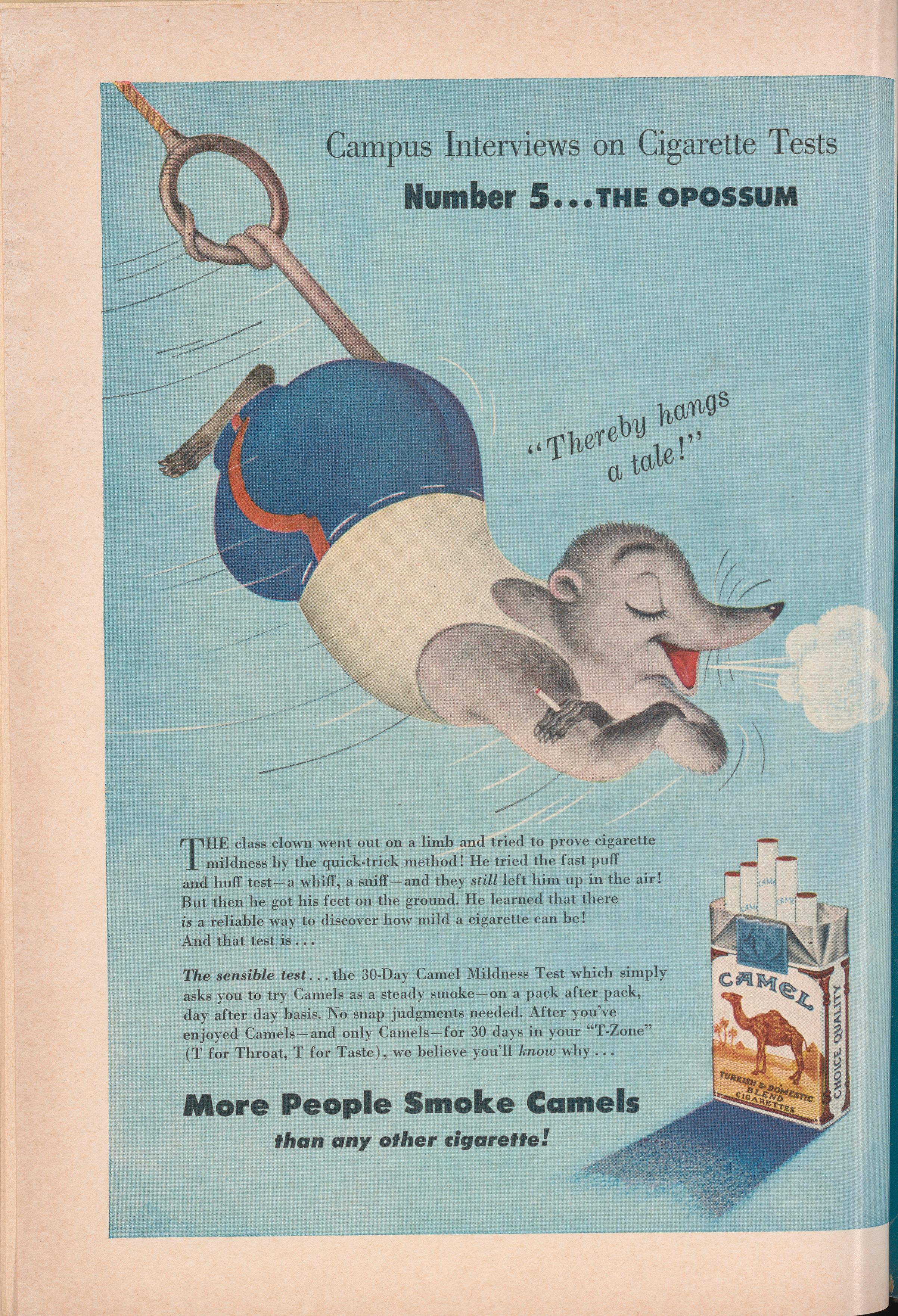
THE class clown went out on a limb and tried to prove cigarette mildness by the quick-trick method! He tried the fast puff and huff test-a whiff, a sniff - and they still left him up in the air! But then he got his feet on the ground. He learned that there is a reliable way to discover how mild a cigarette can be! And that test is .•.
The sensible test . the 30-Day Camel Mildness Test which simply asks you to try Camels as a steady smoke-on a pack after pack, day after day basis. No snap judgments needed. After you've enjoyed Camels-and only Camels-for 30 days in your "T-Zone" (T for Throat, T for Taste), we believe you'll know why ...
More People Smoke Camels than any other cigarette!
